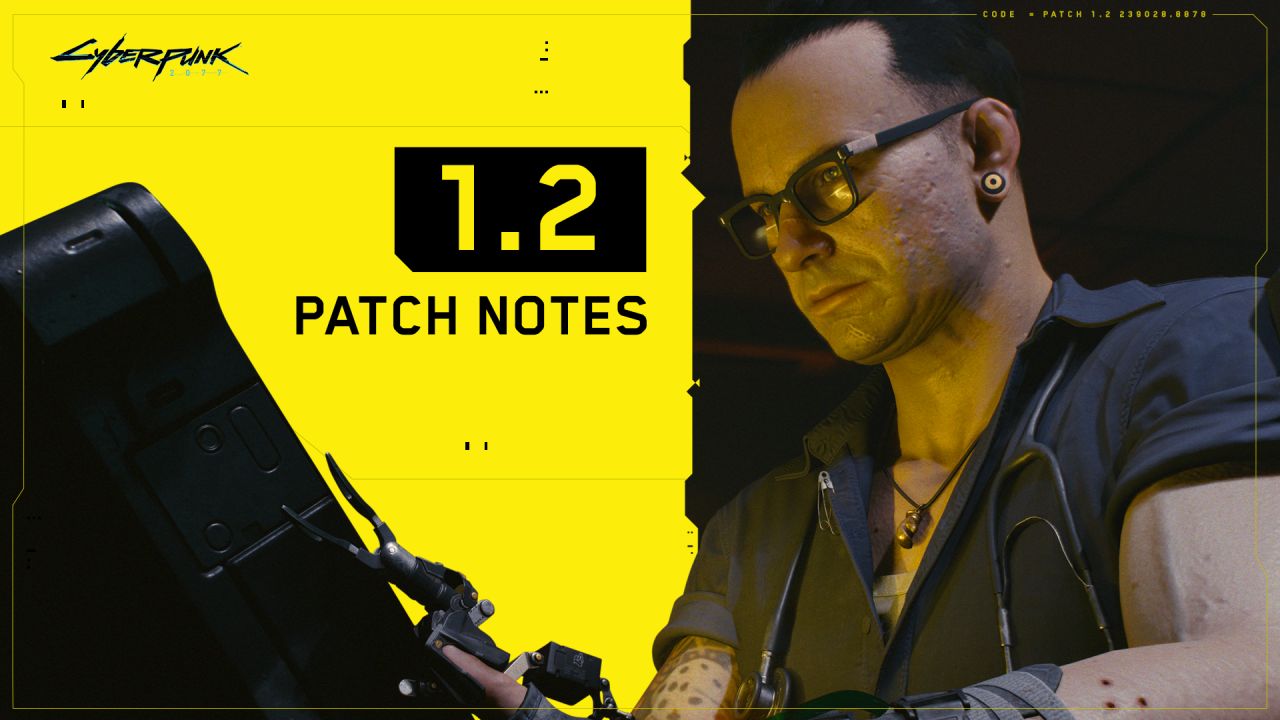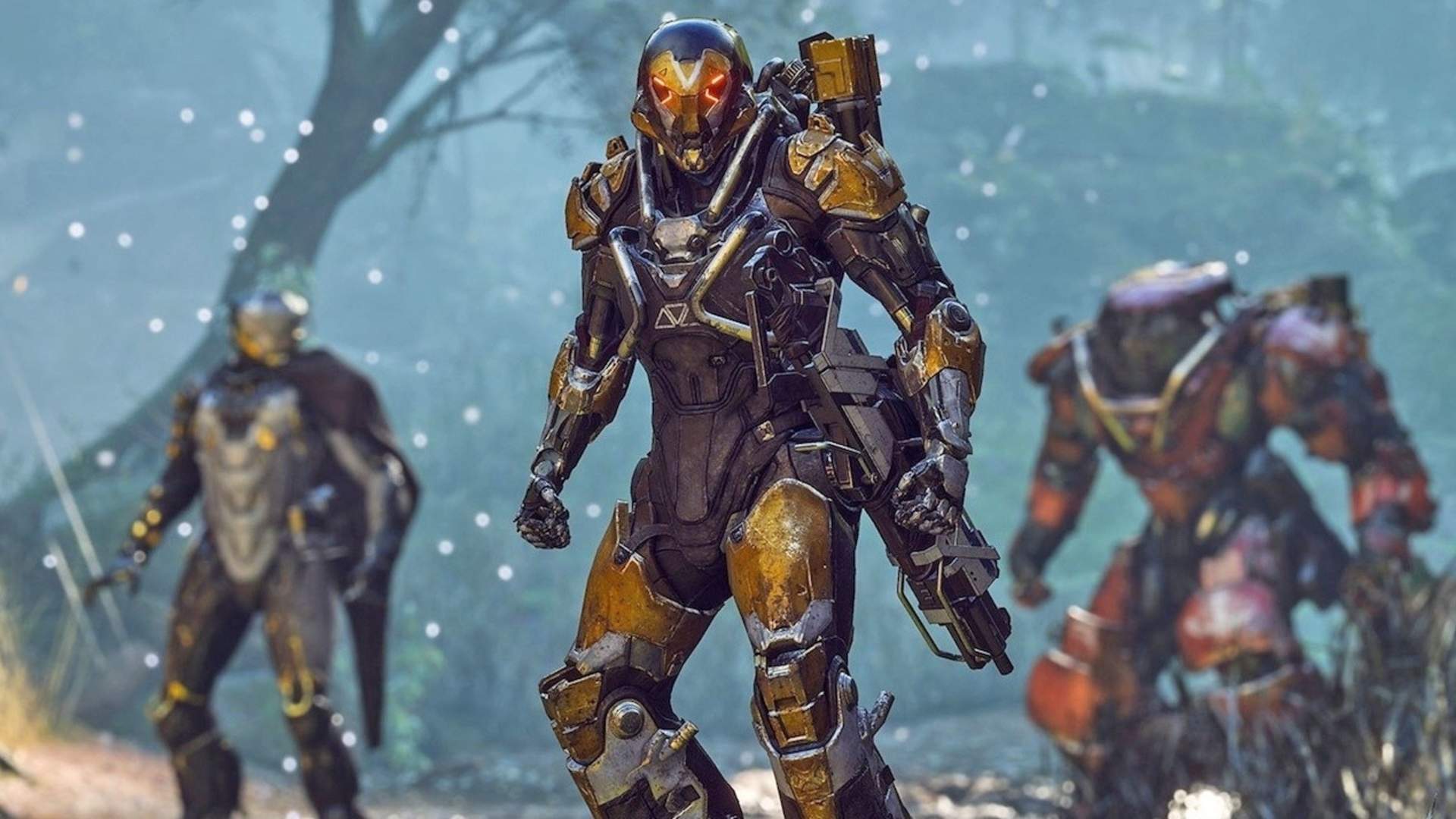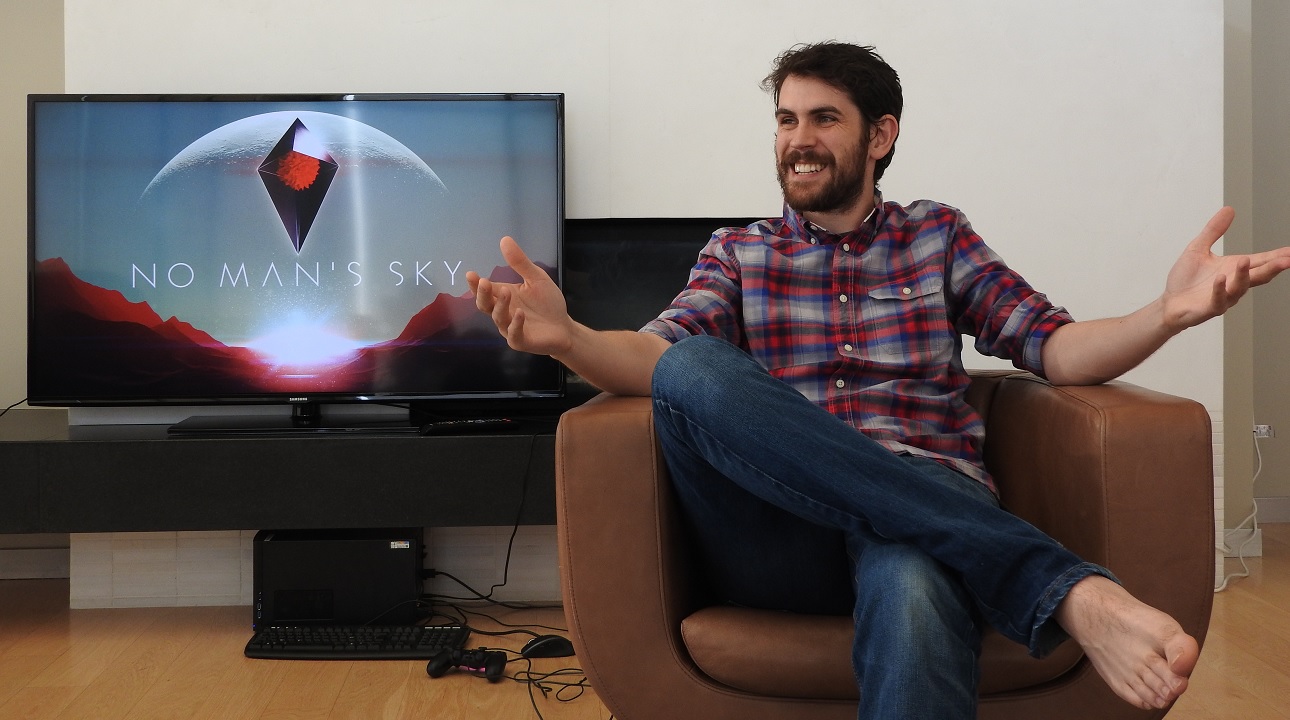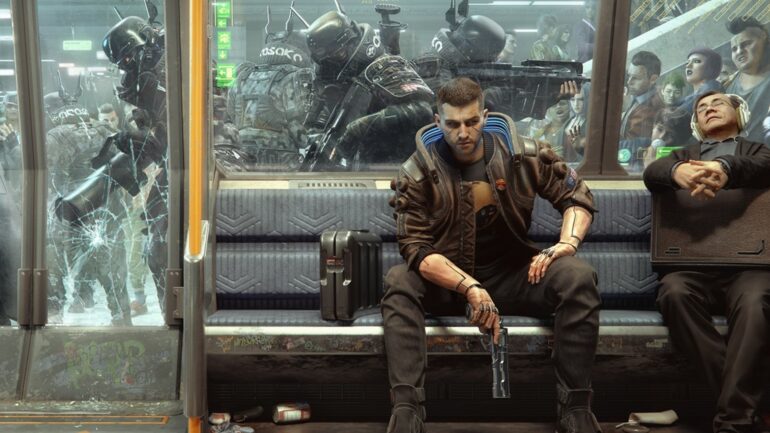One blistering afternoon in 2016, I was sitting with my exhausted family in the Limoges airport cafe. We had been on a brisk sojourn to see our extended family and were begrudgingly heading home. I slumped in my chair, exhausted from the arduous journey to get there and longing for the comforts of the unpleasantly smelly albeit quiet French countryside. Being a moody teenager, I resigned myself to my phone. While scrolling through Facebook, I came across a recently released review for No Man’s Sky. It was a game I had been excitedly waiting for with anticipation, so I quickly read it. Unfortunately, like Orpheus, I wish I had never looked. I thought back to this moment, the day Cyberpunk 2077 received its first review. Just as I had slumped in disappointment in that airport café, upon hearing of Cyberpunk 2077’s immense failures, I slumped once more.

Cyberpunk 2077 Vs. No Man’s Sky
Making a comparison between Cyberpunk 2077 and No Man’s Sky seems all too apt. Both over-promised and raised expectations too high, and both failed to deliver on said promises. But there is a key, and ultimately fundamental, difference that makes the comparison unfair.
When No Man’s Sky released its first teaser trailer back in 2013, it promised something wholly unique. It had two unique selling points (USP): the first was that you could travel from the surface of a planet into space seamlessly; the second was that you could explore 18 quintillion “unique” planets. No Man’s Sky would go on to promise far more than it could ever hope to deliver in its three-year development time. But, at the very least, it delivered on its unique selling points. At launch, you could explore as many planets as you wanted and fly between them seamlessly without ever experiencing a loading screen.

On the other hand, while Cyberpunk 2077 received an inordinate amount of hype, it promised nothing new. In fact, Cyberpunk 2077’s USP was its open-world city, something that had been done countless times before it. To deliver on this promise, all it needed to do was do what had already been done. It simply needed to mimic the success of games released seven years before it. Unfortunately, when Cyberpunk 2077 launched on December 10, 2020, not only did it fail to live up to its promised expectations, but it also failed to deliver its USP.
The Post-Launch Updates
Of course, the comparison between the two games is not in their failed releases but in their attempts to fix them post-launch. In November of 2016, Hello Games released the Foundation Update. It sought to rectify many of the issues with No Man’s Sky while also delivering on some of its promises. While not a huge leap forward, it was widely regarded as a good start. This update launched three months after the game’s initial release. Four months later, Hello Games would release another significant one: the Path Finder Update.

The process to get No Man’s Sky to its promised state has been arduous and long. In fact, No Man’s Sky is still being updated with significant updates nearly five years later. Just yesterday, Hello Games announced the brand-new Expeditions Update. In 2020, No Man’s Sky was even praised for its continued dedication to finishing its development by winning the Best Ongoing Game Award.
Cyberpunk 2077 Patch 1.1 & Patch 1.2
Cyberpunk 2077 has undergone a similar endeavor to rectify the mistakes made during its development with two “major” patches. The first was Patch 1.1 released one month after its initial launch. This was not received well at all. It failed to fix the major issues plaguing the title and thus never felt significant enough. It also managed to introduce a brand-new game-breaking bug that required its own patch to fix.

Patch 1.2 was released on March 29 (three months after its original release) and attempted to make up for the failings of its first patch. The patch, totaling over 8,000 words, attempted to repair many of Cyberpunk 2077’s most critiqued features, such as its broken police system. It was supposed to be another step in CD Projekt Red getting the game back on the PlayStation store. They claimed that “each and every [update] brings [them] closer to going back to the PSN store.” Unfortunately, while the patch does seem to fix a significant amount of bugs and glitches, it fails to deliver on many of its promised gameplay features.
Should They Be Fixed?
I, therefore, believe that the comparison between Cyberpunk 2077’s initial post-launch updates, a game with 500 developers working on it at its peak, and No Man’s Sky (which has 26 employees, according to a 2020 interview) is grossly misguided. Cyberpunk 2077 is a game that has reportedly been in development as early as 2012. It had a much larger team and far more money backing it.
However, this is ultimately beside the point. Whether or not No Man’s Sky’s initial rollout of updates was more successful than Cyberpunk 2077’s is inconsequential. Regardless of the quality of the updates or the attempts made to fix the game, I strongly believe these games shouldn’t have been released in the first place.

First, I must stress that I believe all consumers should be entitled to the product they were promised. While not every game will meet fans’ expectations, they should at least meet the expectations set by developers. If the game promises to be “the next generation of open-world adventure”, it should, at the very least, include gameplay elements present in games released years before it. Secondly, I believe it is crucial to establish a clear distinction between releasing an incomplete game and fixing a game post-launch.
Releasing An Incomplete Game Vs. Fixing It Post-Launch
When Assassin’s Creed: Valhalla launched back in November 2020, it did so to good reviews. However, the game was released with numerous bugs and, as a result, has required a significant amount of patching to rectify these issues. Features have also been added to the game, such as river raids. However, these weren’t essential to the game’s success. In essence, they weren’t a part of its USP.
When Anthem launched back in February 2019, it received damning reviews. It was so heavily criticized that the developers felt the need to do a “fundamental restructure” of the game with Anthem 2.0. Unfortunately, it was apparently too big an undertaking. EA announced that it was canceled last month and will never see the light of day. These two examples best distinguish the differences between releasing a game that requires tweaking after launch and releasing a broken and unfinished game.

Cyberpunk 2077 is technically both, but primarily the former. It is a game that was released unfinished, with several key components missing or unrefined. In fact, it was so broken that Sony Interactive Entertainment removed it from their digital storefront. The reason distinguishing the differences between the two is so important is while I don’t believe releasing a buggy game is a good practice, it is still far more acceptable than releasing a game that quite literally doesn’t function on last-gen consoles. It is the equivalent of releasing a movie with unappealing CGI compared to releasing a movie with the CGI simply unrendered. It is unheard of to do the latter in the film industry. So why is it acceptable to do with video games?
Cyberpunk 2077 Is Just The Beginning
While No Man’s Sky has gone on to receive critical acclaim since its slew of updates, I feel like its success is an example of rewarding a bad business practice. People wishing for Cyberpunk 2077 to finally be the game it promised to be seems like a futile endeavor. It is as wrong as when people praised Bethesda for finally adding NPCs to their MMO Fallout 76.
It’s not that I don’t think CD Projekt Red will fix Cyberpunk 2077; it’s that I don’t think fixing it really addresses the issue at hand. Cyberpunk 2077 should remain an example of what happens when you rush a game’s release despite knowing full well that it isn’t ready. It should remain as a warning to other developers of what you shouldn’t do. Unfortunately, its ridiculous success prevents that from happening.

Regardless of whether CD Projekt Red ever fixes the mess of a game, its huge financial success ensures that other developers will follow in their footsteps. As of December 2020, Cyberpunk 2077 had sold 13 million copies. No Man’s Sky saw huge success upon launch despite being critically lambasted. Even Anthem somehow managed to make $100 million in digital revenue at launch. It becomes blatantly apparent that building up enough hype around a game will ensure success, regardless of your game’s overall quality. Or if it’s even finished.
Voting With Your Wallet Won’t Work
I’ve tried to think about what we can do in response. The obvious answer is voting with our wallets. It becomes a tradition that whenever a game developer does something terrible or causes an uproar in the gaming community, the response is “Vote with your wallet.” In essence, they refuse to pay for the things they make in the future. Unfortunately, CD Projekt Red made that impossible. Cyberpunk 2077 was released on December 10, 2020. CD Projekt Red lifted the review embargo on December 7, 2020. This literally meant that consumers had just three days to decide whether to buy the game.
It also meant that, in many cases, players had pre-ordered the game without prior knowledge of the game’s bugs. You could preload Cyberpunk 2077 as early as December 3 (Xbox) or December 8 for PS4. It is often the case that if you preload a game, you cannot refund it. Had Microsoft and PlayStation not offered refunds, many players who had not had the chance to read reviews before preloading would have lost a significant amount of money. It is worth noting that Cyberpunk 2077 sold 8 million pre-order copies.
So, if voting with our wallets won’t work, then what are we supposed to do? Fortunately, Sony Interactive Entertainment removing Cyberpunk 2077 is a step in the right direction in discouraging developers from releasing half-finished games. But, unfortunately, I can’t see this as a practice that will go away any time soon. It is one that will likely continue to happen regardless of what we do, especially considering Cyberpunk 2077’s immense financial success.
Losing Faith In Video Games
I think back to that warm day at Limoges airport and the sinking feeling I felt deep within my stomach. Back then, I didn’t have the same self-awareness as I do now. I lacked the ability to ignore the unparalleled hype surrounding a video game. I was young and naïve, and I believed Sean Murray when he said all those fantastic things about his upcoming game. Why wouldn’t I? Hello Games abused my trust. I still can’t muster the motivation to replay it, despite its countless efforts to update and finally finish their game. The whole situation sucked, but I got over it.

CD Project Red, on the other hand, has made me lose faith in video games. It manipulated players by barely showing off last-gen gameplay up until its release. Like Hello Games, it held back reviews until the last minute. They may have done it for perfectly innocent reasons. However, I find it hard to believe that CD Project Red did it for any other reason than because the game was broken. Frankly, their manipulation and, thus, my loss of trust in them as a company isn’t really the ultimate issue. This is nothing new; video game companies, notably EA, have manipulated players into buying their products for decades. My real issue lies with the fact that Cyberpunk 2077 has quite literally rendered my excitement for upcoming titles non-existent.
Conclusion
Back in 2016, I was not a part of the games journalism sphere. My enjoyment of games, or the amount of faith I had in the companies that produced them, didn’t infringe on my career. Now, as someone whose career revolves around covering games, I find that my diminishing interest in video games is adversely affecting my work life. It has always been my dream to be a games journalist. So, to have my love of the medium fade away literally feels like my dreams are crumbling.
If companies that were once praised for their originality and dedication to the medium are now content-releasing broken games, then why should I bother getting excited about anything they put out? I wish I could go back to being a naïve teenager who believes in the wishful thinking of developers. Alas, I cannot. CD Projekt Red released a bad game that disappointed a lot of people. They’ll retroactively fix it, and people will move on with their lives. It’s just a shame there will be no real consequences for their actions.






